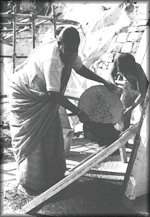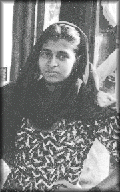 |
|
|
|
||||||||||
| |
|
|
|
 |
|
|
|
|
|||||
 |
|
|
|||||||||||
 |
 |
|
|
||||||||||
 |
|
||||||||||||
| |
|
||||||||||||
| |
|
|
|
|
|
|
|
|
|
|
|
|
|
SAMINA'S
STORY (PART I)
If a Muslim in Mumbai (Bombay) offers you mutton it's a fair bet they really mean goat. A goat's a very adaptable fellow. Far more useful than a sheep. It can exist on anything in the city. The goat doesn't need grass to chomp on. Anything that grows, through cracks in the pavement will do. As will pants, shirts and bras left out to dry on a clothesline. So it's no surprise to find a mob of goats on the pavement outside Jhula Maidan in Byculla, the district in Maumbai where our story takes place.
Jhula Maidan'a small municipal park. Very small, maybe the size of a soccer pitch. It's perched on the corner where Apna Jhopadpatti runs into Maulana Atad Road, diagonally opposite the Alam Masjid (or mosque).
And it's home to fifty or more families, many of them Muslim, who live in huts built against the walls of the little dusty park.
And it's where I start my working day.
And the first
person I invariably see is Samina. Samina thinks I'm nuts. And she isn't afraid
to say so, to my face. But it's usually an affectionate nuts. Samina may groan
and moan about life, but she's a big-hearted woman who's been through a hell
of a lot, even before I first met, almost ten years ago. 
And how Samina got to live here on the pavement outside Jhula Maidan is typical of so many of the homeless in India, and so different from the experience of homeless people in the West that it bears retelling.
"I was married off when I was ten years old. That's how the story starts. Nothing unusual, Because it takes places in Bihar, (if you get out out the atlas, it's the chunk just below Nepal) one of the poorest and most backward areas in the whole of India, where child marriage is the norm. You can get betrothed as early as five or six. But you don't actually get physically married until puberty, say thirteen or fourteen. Then you go to live with your husband in his family's house.
Samina's future mother·in·law had just the one son, and she desperately wanted to see her son married off before she died. But when Samina arrived as a daughter·in·law, trouble broke out almost immediately. I have to admit it: Samina may be big-hearted but she does have a quick temper. Not an easy person to live with!
*****
"Because that husband of mine just couldn't be bothered to work. All he's ever wanted is to be well-fed and to go to the movies."
*****
And not one to meekly obey her mother-in-law! They quarreled about just about everything. About Samina's eating habits and her cooking. The only person Samina did get on with was her husband. But right from the start Mulla (his nickname) displayed one major flaw.
"He didn't like to work," Samina admits. "He didn't like to work and he didn't want to work. You see, he was the only son and so he was terribly spoilt. His parents never ever insisted he should go out and work
No work means no money to give Samina to buy food or clothes, or whatever. She goes and asks her In-laws for money. You can guess what they tell her!
The result is that Samina and Mulla set up house on their own, and go to work on a building site, carrying mud and bricks. Not an easy time.
"There were some days when we starved. There were some days when we managed to eat. Somehow we carried on.
But then Samina had her first daughter - Zarina. An extra mouth to feed. Something would have to change.
"I sat my husband down. Now, look here, I said. Your stomach, my stomach. And now we're about to have a child, that child's stomach. So how are we going to survive? How are we going to feed that child? Eh? How we going to feed ourselves? We've got to go and get some real work.
 Mulla
knew how to weave cloth. So Samina took a loan from her father and bought
a loom. But life never runs smoothly for Samina. Her sister-in-law - Mulla's
sister - picked a fight with her. The upshot was that Samina and Mulla got
thrown out of the village. No more roof over their heads.
Mulla
knew how to weave cloth. So Samina took a loan from her father and bought
a loom. But life never runs smoothly for Samina. Her sister-in-law - Mulla's
sister - picked a fight with her. The upshot was that Samina and Mulla got
thrown out of the village. No more roof over their heads.
There follows a long saga of false starts, eager reconciliation, and then more shattered dreams. And through it all, it's the adolescent Samina who somehow feeds all three of them., scavenging at the local railroad station in Madhubani, a place where I, believe it or not, have actually stood many years ago, in a different life.
"Goods trains would come, and they would unload all the goods at the station. So when I went to have a bath I would take a sack with me, then go to the station, and as they were unloading, whatever fell to the ground - bits of rice or grains of wheat - I'd quickly pick it up, stuff it in my sack and bring it back home. And that, quite simply, is how we survived!"
"Because that husband of mine just couldn't be bothered to work. All he's ever wanted is to be well-fed and to go to the movies. Even back then, when we were starving! That's all he wanted. But he was never willing to go out and actually earn money to help pay for his pleasures. He figured that if his parents wouldn't sweat their guts out to support him, then it was my duty as his wife."
Result: they could never make ends meet. Many days they quite literally went without food. To keep up appearances in front of the neighbors, Samina would pretend to cook, But in reality she'd never even light her chula or stove.
Samina's parents got wind of this. They started slipping her the odd half kilo of rice or lentils. And started fighting and blaming themselves for the mess Samina was in. They were desperately unhappy for their daughter. And unhappiness in turns begets more desperation.
Samina, probably by chance, overheard them talking about her one day:
"They knew I was stubborn and I wouldn't go quietly. And they knew I'd probably get chucked out my husband's house again. I don't think they could face the shame. This is what my own mother said" If she comes back here, we'll give her poison. It's the only way out. "
"You can bet I was upset! Wouldn't you be? From that day on, I decided that whatever is going to happen to me, it's going to happen in my husband's place. I swore that from I'd never go back to my parent's house except dead.
So Mulla and Samina decide to leave Bihar. Mulla goes first, alone, to Bombay, a thousand miles and change from Bihar. It's the rainy season, when work is scarce, even in Bombay (as it was then called). People in the great metropolis sometimes have to resort to begging to make ends meet.
But Mulla thinks this is great. He rushes back to Bihar to tell Samina the good news.
Samina is singularly
unimpressed.
"I know what you've got in the back of your mind. You'll sit at home, and I'II be the one who has to go out and beg. No thanks!"
"No, I promise you, Samina. You'll sit at home and 1'11 go out and earn enough for all of us. 1'11 turn over a new leaf. You'll see! Honest, I will!"
And so off they go, the four of them - Mulla, Samina, two year-old Zarina, and an infant son, just born. Third class rail, from Madhubani to Bombay.
But the baby gets sick. A doctor in Allahabad, where they have to get down to change trains, gives them free medicines. They get back on the train.
...and that child was just terribly sick. It took us seven whole days to come to Bombay. We traveled without food, without water, absolutely bone-dry, and that baby of mine was very, very poorly. And to make matters worse, halfway through the journey the ticket collector saw us and threw us out of the train, because of course, we were traveling without tickets. So then we had to wait in the back of beyond for yet another train. Well, we got one. Same story: dodging the inspectors and nothing to eat or drink."
"Sometimes a tea-seller would walk through our compartment. he'd look at Zarina, see a small child with an absolutely hungry face. And they'd give her a cup of tea, sometimes a bhajiya (vegetable patty) to eat. But that was it. And this is how we eventually came to Bombay. Almost as soon as we got down from the train, somebody saw the baby and said: "That baby is very ill. You've got to get it to a doctor." We found a doctor, he wrote something on a piece of paper, told us to take it to Nair Hospital. And they admitted him."
"The third day, the hospital asked my husband to get blood for the baby." (In India, if you're poor, the hospital makes you find medicines and things like blood at the Blood Bank)
" That husband of mine - what a big coward! he takes the piece of paper from the Sister and goes to stand in line at the Blood Bank. He stands and he watches what's going on. There's a man lying on a bed nearby and he's giving blood. My husband panics. He runs back outside, where I'm waiting with Zarina: "They're taking blood from people. They're going to take blood from me! What the hell am I going to do?"'
You can guess the rest.
Mulla runs away, bolts the hospital, hides. A couple of days later, the Nurse comes on foot to where they're sleeping on the pavement outside Jhula Maidan, asks Samina where the blood is.
Samina doesn't know. She doesn't have any money to buy blood. Quite possibly, at the age of twenty, she didn't really understand how important the blood was. She did nothing.
All Rights Reserved: Independent Broadcasting Associates
Essay
Episodes 1 - 4
Episodes 5 - 8
Episodes 9 - 12
Episodes 13 - 16
Episodes 17 - 20
Episodes 21 - 24
Episodes 25 - 28
Episodes 29 - 31
Main
Episode List
Cast of Characters
Credits
CD set
© 2002,
Independent Broadcasting Associates, Inc
Privacy Policy |
Terms of Use